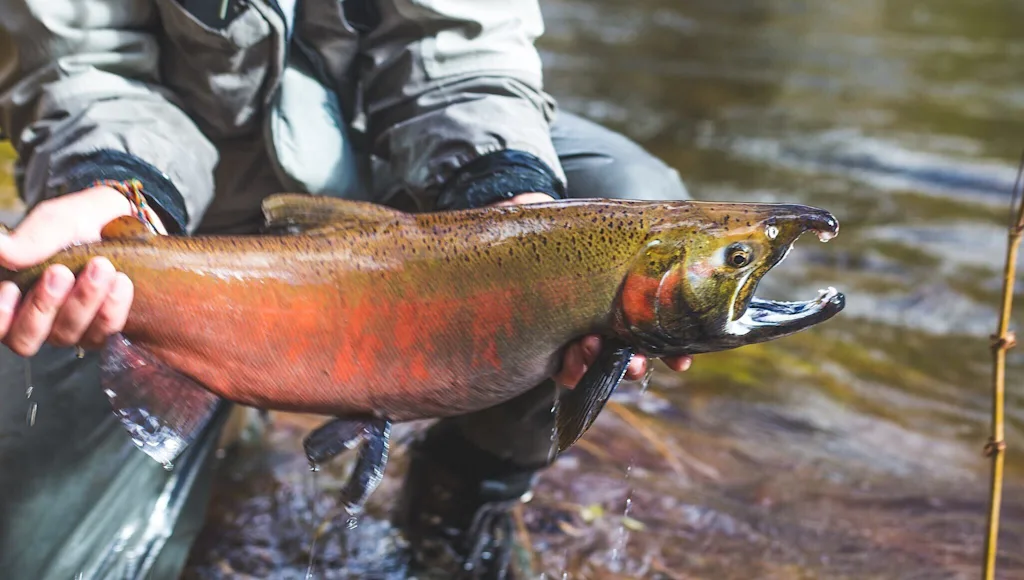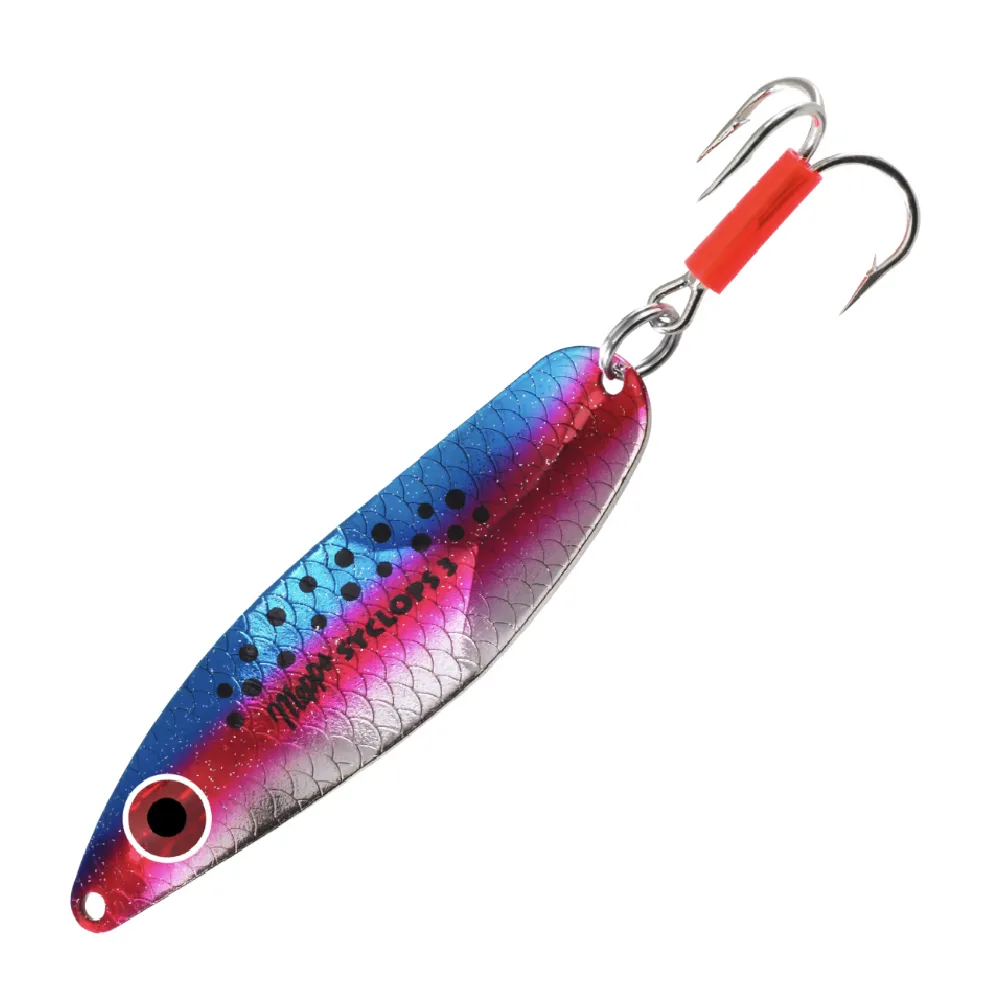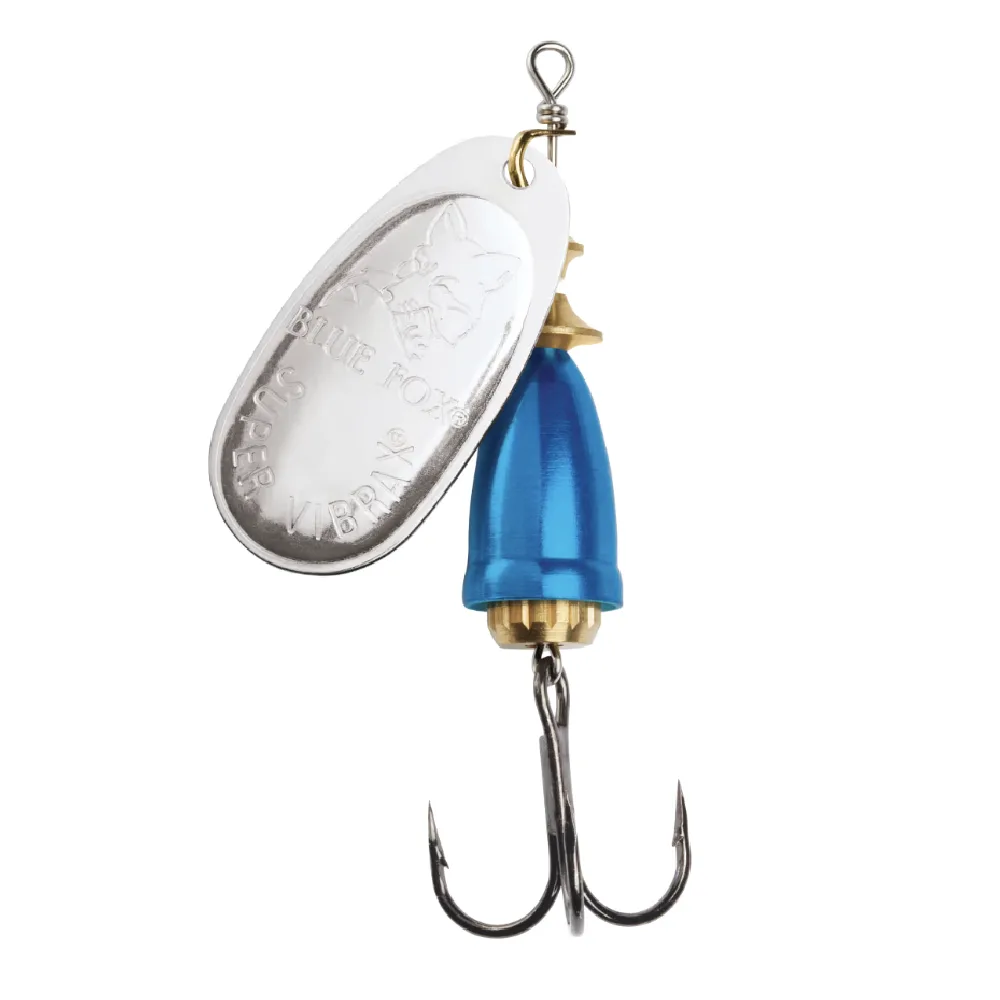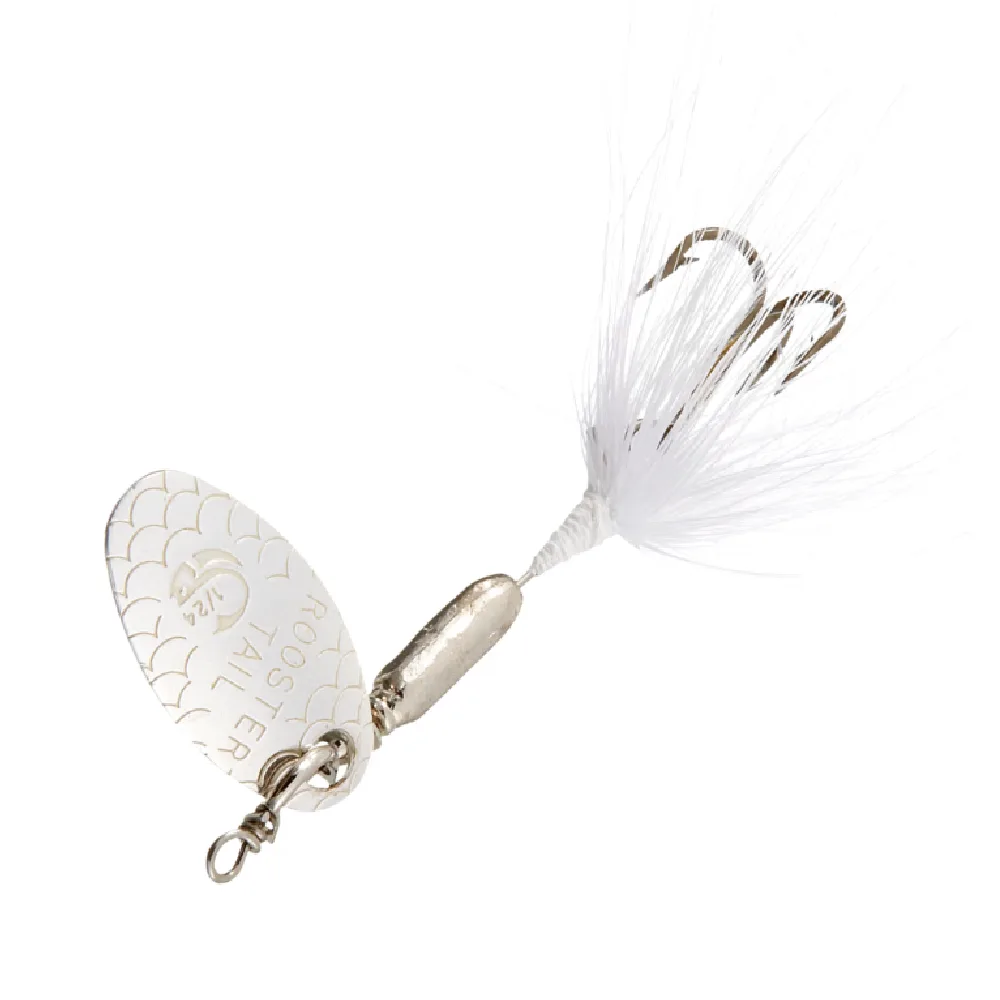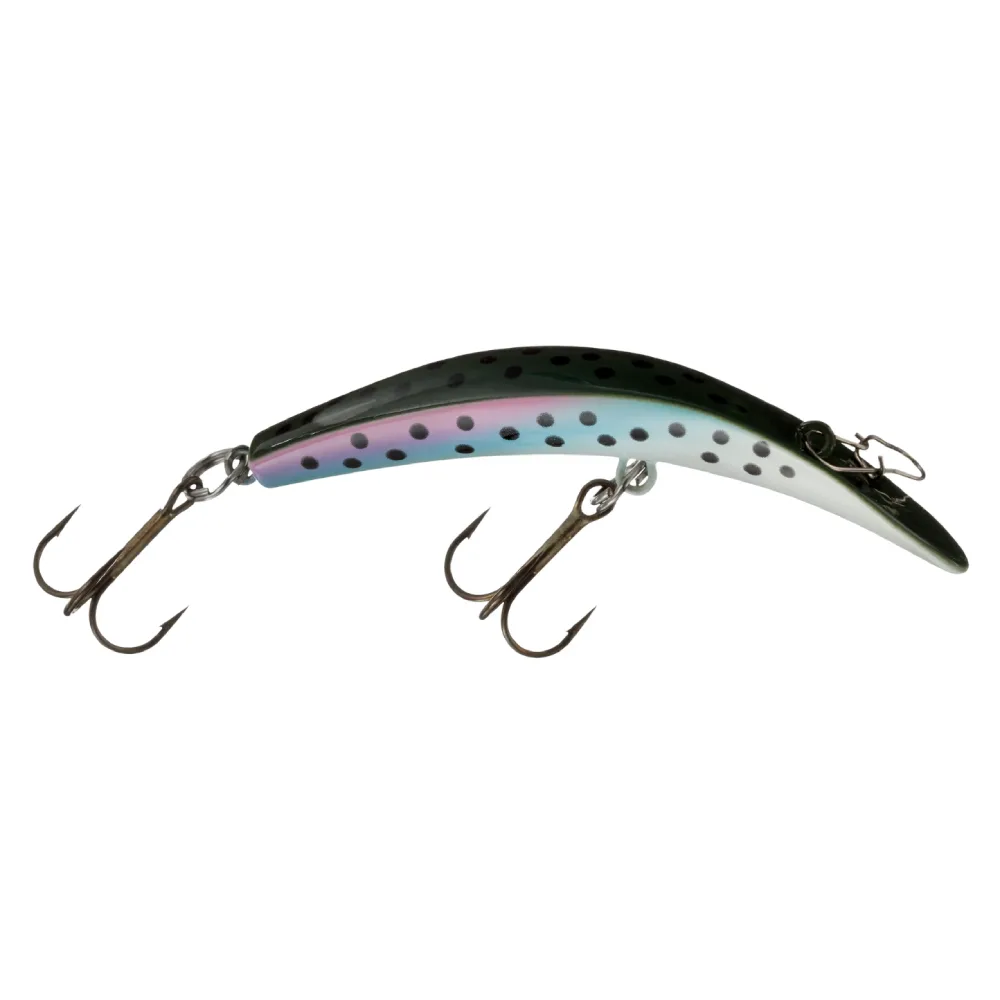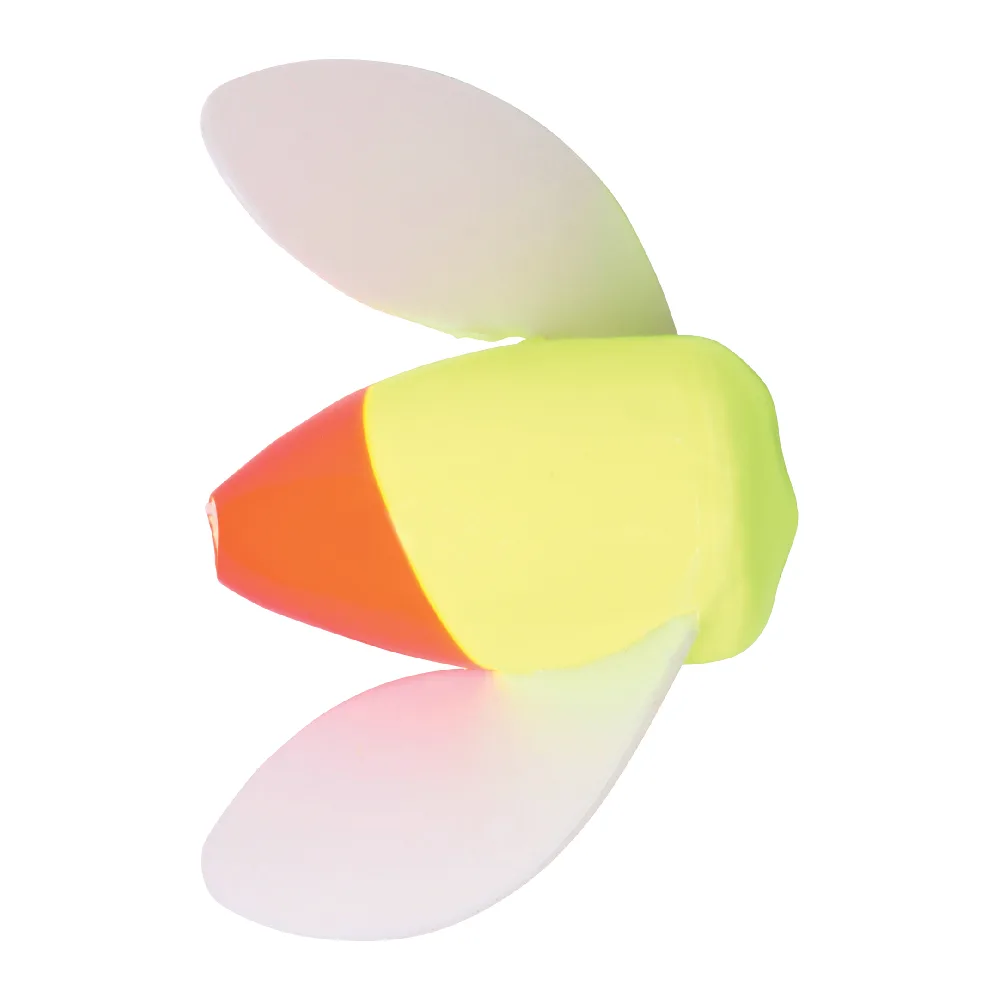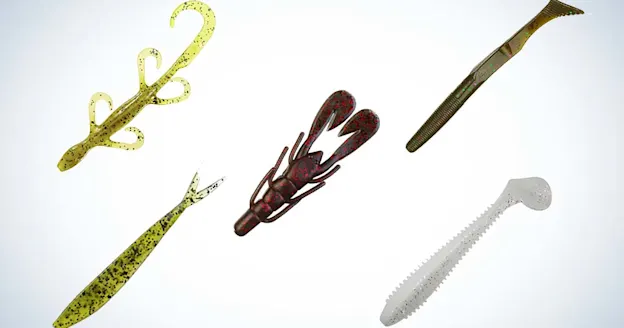We may earn revenue from the products available on this page and participate in affiliate programs. Learn more ›
Growing up as I did in mid-Ohio, I didn’t have much reason to think about what might constitute the best salmon lures. Walleyes? Yes. Crappies? Absolutely. Smallmouth? From time to time; but never salmon. Fast forward to 2015 when my move from the Midwest took me to the Pacific Northwest—Washington state specifically—and now my life revolves around salmon. Spring chinook. September silvers. Fall kings.
Fortunately, there are plenty of great fishing lures for salmon to choose from, which, to be honest, might prove to some a catch-22. Which ones are worth buying—and will actually land you a catch? These here make for my top five best salmon lures year in and year out, including spoons and spinners.
Best Overall: Mepps Syclops Spoon
Best Budget: Blue Fox Vibrax Spinner
Best Spinner: Worden’s Original Rooster Tail
Best for Trolling: Luhr Jensen Kwikfish
Best for Bank Fishing: Yakima Bait Spin-N-Glo
Best Overall: Mepps Syclops Spoon
Specs
Five sizes/weights
17 color patterns
Available in a saltwater/single hook
Made in the U.S.A. in Antigo, Wisconsin
Pros
Incredibly versatile
Casts like a bullet
Scores a solid 10/10 on the user-friendliness scale
Affordable
Cons
Larger sizes a little heavy for trolling
If someone told me I was limited to a single salmon lure for both kings and silvers for the rest of my fishing days, I’d stock up on Mepps Syclops #3 (1-ounce) spoons. To get even more specific, the pattern would be what the company calls Rainbow Trout, a fish-kilin’ color scheme combining silver, pinkish-red, and speckled blue. While it tends to be best on sunny days—at least in my experience—this teardrop-shaped hunk of metal just flat catches fish. Period. Cast it. Jig it. Quick troll it. Work it shallow. Work it deep. It comes in five sizes ranging from #00 (1/8-ounce) to the aforementioned #3 weighing in at a full ounce and a smaller Bantam version. More than that, it’s an excellent multi-species lure, not just for salmon.
Best Budget: Blue Fox Vibrax Spinner
Specs
Four salmon-friendly sizes
46 color patterns
Two-part bell-shaped body
Super sharp treble hook
Painted/printed and UV-bright finishes
Stainless steel shaft
Pros
Great for open water or rivers/streams
Casts easy and far
Can be trolled or cast
Low/no line twist
Stainless steel components hold up in the salt
Cons
Not a fan of the treble hook; replace with split ring and Siwash
Say the words ‘steelhead’ and ‘spinner’ out here in the Pacific Northwest, and the conversation is almost guaranteed to come around to the Blue Fox Vibrax. In case you didn’t know, Blue Fox is a subsidiary of Rapala, the well-known and respected legendary lure maker. But the Vibrax isn’t only for river steelhead; oh, no! She’s a fantastic salmon spinner, especially for fall silvers or, as we use them, for fish at the mouth of the Columbia River off the North Jetty.
The 5/8-ounce version throws a country mile, sinks fast, and starts turning with just a quick snap of the rod tip. And vibration? There’s a ton of it, which is likely why the Vibrax works so incredibly well. And she does.
Best Spinner: Worden’s Original Rooster Tail
Specs
Three sizes: ½-, ¾-, and 1-ounce
24 colors
Genuine silver, brass, or copper blades
UV finishes on some models
Pros
Lifelike hackle tail with unique spinning action
High on the user-friendliness scale
Good hooks
Excellent price point ($5) for a quality spinner
Cons
Cheap swivels will result in hella-line twist, guaranteed
Salmon. Steelhead. Walleyes. Crappies. Trout. The occasional really hungry flathead or channel ‘cat. It just doesn’t matter. If you’re looking for one lure that does it all, look no further than an in-line spinner. And few names are as traditional nor as well-known as the Original (OG) Rooster Tail. It’s a versatile lure, with many trolling a tail behind a downrigger ball or on a lead-core flatline. However, I prefer to throw either the ¾- or 1-ounce blades with an 8’6” Okuma SST spinning rod and Pflueger President reel spooled with #30 braid. For silvers? A silver blade, and either a pink (PK), white/red (WHR), or chrome whitetail (CHWT) body.
Best for Trolling: Luhr Jensen Kwikfish
Specs
Three sizes
Wide variety of color schemes
Two quality treble hooks
Dives to 15’
Pros
Versatile; can be trolled or fished stationary on anchor
Irresistible side-to-side ‘rolling’ action
User-friendly tunable motion
Cons
More expensive
No self-respecting salmon fisherman in the Pacific Northwest—or on the Great Lakes, for that matter—would ever be caught on the water without at least one Kwikfish. Another child company of Rapala, Luhr Jensen, sells hundreds, if not thousands of Kwikfish every year, and for good reason. They catch fish. While I’m sure silvers (coho) fall victim to anglers working Kwikfish, the hard baits are traditionally known as a killer king/chinook lure. These billed diving plugs are often fished as is. However, some will sweeten the lure by wrapping it in a sardine, anchovy, herring, or tuna belly fillet.
Best for Bank Fishing: Yakima Bait Spin-N-Glo
Specs
10 sizes
Hundreds of colors
Pros
Multi-species design
Ridiculously inexpensive
Provides flash and vibration
Extraordinarily user-friendly
Cons
Once you start buying Spin-N-Glos, it’s almost impossible to stop
Plunking is a salmon fishing technique used by bank-bound river anglers in which the mainline goes to a three-way swivel, which then goes to a short monofilament dropper on the bottom with a weight/sinker. A 24” to 30” leader is tied to the remaining eye, that culminates in a Spin-N-Glo above a self-snelled #3/0 or 4/0 Daiichi blood-red barbless hook. Deployment is simple—toss it out, tighten it up, put an ‘alarm bell’ on the rod, rod in the holder, and take a seat in your chair, letting the current do all the work turning the Spin-N-Glo. Maybe…just maybe…you’re slipping a dyed coon shrimp on the hook. It’s as easy as it gets, and salmon can’t seem to resist these small flashing bits of plastic and Mylar.
How We Picked the Best Salmon Lures

Let’s face it. A lot of fishing lures are intended to catch fishermen more effectively than they are, well, salmon. And so you’ll find a flat ton of lures hanging on the rack. However, there are a handful that genuinely do ‘cut the mustard’ as being the best any angler can have in his or her tackle box. These criteria include:
Effectiveness
Does the lure have the reputation of being able to put fish in the boat? There are hundreds of pretty and incredibly eye-catching lures out there meant to mesmerize kings and silvers, humpies (pinks) and dogs (chum), but at the end of the day, the true test of a lure’s effectiveness lies in the bottom of the livewell.
Versatility
This is why I’m partial to spoons. You can troll a spoon. Cast a spoon. Jig a spoon. They catch salmon in big rivers, small rivers, lakes, and the open ocean. They’re available in myriad weights and configurations, and generally speaking, they have one moving part: the hook at the bottom. So ask yourself if this lure is a one-trick pony or if you can use it across the board and the calendar.
User-Friendliness Rating (UFR)
I’m a huge fan of simplicity. That is, I want whatever I’m using—be it a salmon lure or a set of fishing waders—to rank high on what I call the user-friendliness scale. Spoons are simple. Spinners are simple. Cast a Spin-N-Glo and let it work its magic. Simple. Here, I’m looking for a lure with few, if any moving parts. No batteries to change. No non-fastened parts. Simple.
What To Consider When Choosing a Salmon Lure
It’s impossible to have too many salmon lures. Or fishing lures in general, if you really want to get particular about it. However, where you’re fishing and the method you’re using can certainly dictate what type of salmon lure—spoon, spinner, wobbling plug, trolling, casting, or plunking—might be most effective.
Intended Use
How do you intend to use the lure? If you’re casting from shore, a spoon or spinner would get the nod. Anchored up, and a Kwikfish might be the ticket. Trolling? Any of the above would be a good choice, although the Kwikfish or a light spinner/spoon would be best.
Water Depth
Water depth or where the fish are in the water column is certainly a variable. A 1-ounce Rooster Tail or Mepps Syclops spoon can, if desired, get your presentation down deep, while a K15 Kwikfish by itself will take you to 15 feet or so.
Time of Year
March and April usually means cooler water, thus the fish are often shallower. Fall kings in the Columbia, though, will run deeper (about 30 to 50 feet) where the water is cooler, despite the ambient temperatures at the surface. This all said, it’s important to match the lure’s optimal operating depth with where the fish are at any given time of year.
FAQs
Q: What color lures are best for salmon?
Like all fish, salmon can be awfully fickle in terms color. Usually, however, brighter colors—like chartreuse, hot pink, fire tiger, rainbow trout, or red/white—seem to attract the most consistent attention. That’s not to say that yellow, orange, or ‘Electric Banana,’ whatever that might be, isn’t the color du jour.
Q: What is the best time to catch salmon?
The easy answer is ‘any time you can get out and fish.’ Here in Washington state, I’d say September is the best time for silver salmon, while late April and early May (regulations permitting) might be hot for spring kings. Every region in the U.S. is going to be a bit different in terms of timing and salmon, so if you’re new to it, it’s best to do your homework via your state’s fish and wildlife agency’s website.
Q: What’s the best spinner for salmon?
Flashy. Flashy. Flashy. And a ton of vibration. These are the key ingredients to effective spinners, which is why the Vibrax and Original Rooster Tail work so well in a variety of situations.
Q: What is the best depth to catch salmon?
Here is where you’re going to have to rely on your electronics, like a fish finder, to tell you precisely where in the water column the fish are lying. Generally speaking, kings/chinook can be found hugging the bottom, while silvers/coho will be much color to the surface, even as close as 6 to 8 feet deep, if not shallower. No electronics? Look around and see what others are doing, or just start experimenting.
Final Thoughts
When it comes right down to it, nothing works all the time. It doesn’t matter how bright, flashy, wobbly, or expensive your lure may be. The key to salmon fishing success often lies in the willingness to experiment with different styles of lures, as well as different colors and sizes. Water depth and how the lures are presented—i.e. tuned, wrapped with natural bait, scented—are also significant factors in angling success or lack thereof. If you have it in the box, throw it! While we’ve rounded up some of the best salmon lures above, when it comes down to it, you never know what’s going to trip that king’s trigger on any given day.
Why Trust Us
For more than 125 years, Field & Stream has been providing readers with honest and authentic coverage of outdoor gear. Our writers and editors eat, sleep, and breathe the outdoors, and that passion comes through in our product reviews. You can count on F&S to keep you up to date on the best new gear. And when we write about a product—whether it’s a bass lure or a backpack—we cover the good and the bad, so you know exactly what to expect before you decide to make a purchase.

